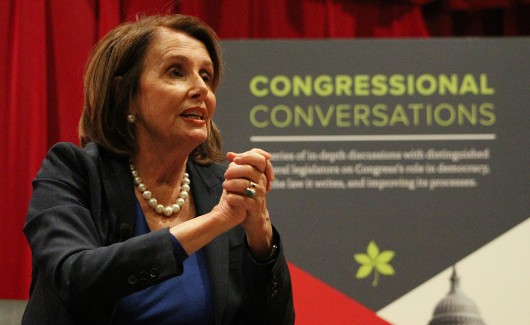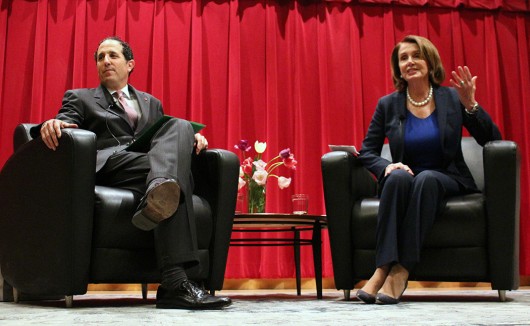
House Minority Leader Nancy Pelosi speaks at Saxbe Auditorium on April 22.
Credit: Michael Huson | Campus Editor
House Minority Leader Nancy Pelosi made a point to not only stress the personal, but political impacts of education Friday during a visit to Ohio State.
The former speaker of the House spoke during a Congressional Conversations event at Saxbe Auditorium as a guest of the Moritz College of Law and John Glenn College of Public Affairs.
“Nothing reduces the deficit more than investing in education,” Pelosi said.
She added that education is crucial to an informed electorate, as well as a tool to “level the playing field” by encouraging innovation.
“Education is the key to it all,” she said. “That’s why this institution looms so large, not just because of what it does for its students, but what it does for American competitiveness and imagination.”
Pelosi said that through the changes she has seen in Congress during her 28-year run representing San Francisco’s 12th congressional district, the increase in female representatives ranks among the most positive of improvements.
When Pelosi first took office in 1987, 23 women served in the House. As of 2015, 84 women serve as representatives in the 114th Congress.

Moritz College of Law dean Alan Michaels (left) and House Minority Leader Nancy Pelosi (right) speak at Saxbe Auditorium on April 22. Credit: Michael Huson | Campus Editor
“We made a decision that we were going to, every year, try to increase the numbers,” she said. “And, of course, we’re not satisfied — we want more.”
Pelosi, a National Women’s Hall of Fame inductee who served as the first female speaker of the House from 2007 to 2011, said she sat “on the shoulders of so many women” of courage during her first meeting, as newly elected speaker, with President George W. Bush at the White House.
“All of a sudden, I realized I was not alone on that chair,” she said, adding that she felt as though she had been joined by other prominent women in U.S. history, including Susan B. Anthony and suffragist Alice Paul. “I could hear them say, ‘At last, we have a seat at the table.’”
Before the event on Friday, Pelosi spent Earth Day touring university’s Byrd Polar and Climate Research Center. Joining her at Byrd Polar was Congresswoman Joyce Beatty, who also spoke during Congressional Conversations.
Beatty told The Lantern that she and Pelosi spent that time meeting with researchers, discussing climate change and examining glacier samples in the center’s freezer.
Pelosi also visited with John and Annie Glenn earlier in the day Friday. Pelosi called the former astronaut and senator an inspiration to the country, adding that John Glenn had expressed concern about finding common ground in the political process and honoring “the responsibility that the American people expect and deserve.”
She said that although negativity has consumed elements of the national political discussion, debates should focus on what affects American lives, citing investments in education, resource allocation and tax policy.
“Show us your values, show the American people your values. The place you find people’s values in the legislative process is in their budget,” she said. “So, I keep saying this: ‘Show us your budget, show us your budget, so people can see what your priority is.’”
Speaking on the Flint, Michigan, water crisis, Pelosi talked about the influence of money in politics and the responsibility of legislators to make representation their priority.
“Negotiations can be eliminated through legislation if you’re not electing people who share your values,” she said. “It’s not about just voting Democratic, it’s about trying to change the money — making sure that whoever you vote for understands what you expect of your representatives in terms of fairness.”
Beatty said she thought Pelosi was forthcoming and kept with the series’ theme of nonpartisan discussion when answering questions on Friday, while highlighting her views of the positives and negatives of U.S. politics.
“She spoke directly to the students,” she said. “I think she gave them great challenges for them to get engaged.”
Moritz College of Law Dean Alan Michaels moderated the Pelosi conversation on Friday. The event is the second in the Congressional Conversations series, following a visit to the same venue by Sen. Rob Portman on April 8.


